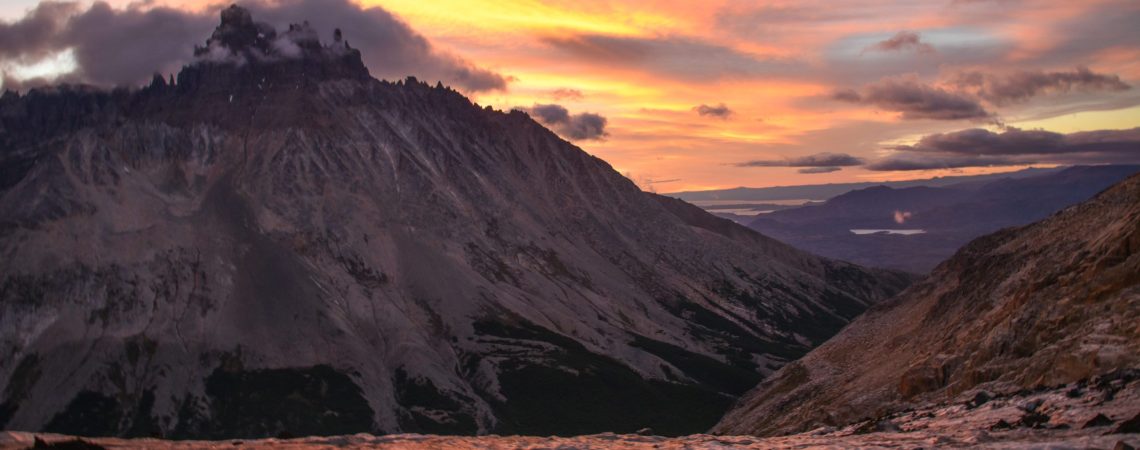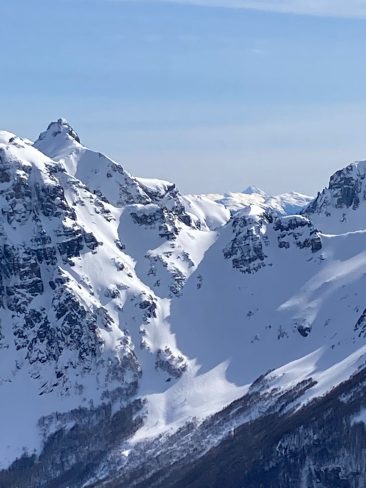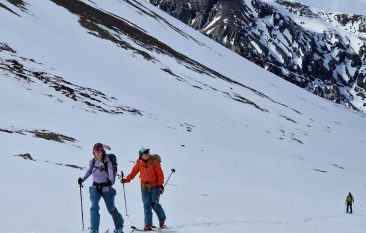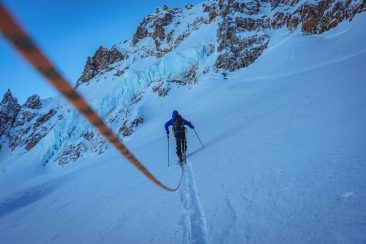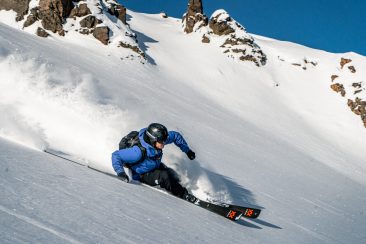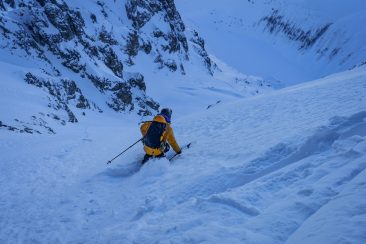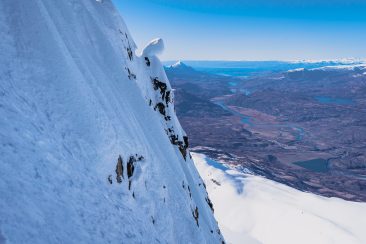A week of skiing in Patagonia will just scratch the surface of the vast touring available in one of the most pristine wilderness in the western hemisphere! Known for climbing and trekking, locals began to explore the ski tour a few years ago and brought back word there is a lot of it! Touring in the Cerro Castillo National Park offers big, glaciated bowls, couloirs, even some tree skiing all untracked as we have travelled so far to enjoy some solitude, Our local friend and guide Diego Saez spent the last several years persuading us to come down and we did! Now we want to share this special place with you.
Dates: September 27 – October 5
Duration: 6 Days of touring, with travel days before anf after
Level: Expert
Client Ratio: 4:1
Cost: $3,900 TOTAL- $500 Deposit/the balance due July 15th
Included:
- 7 nights accommodations in Cerro Castillo; Double & Triple occupancy;
- 6 days of guided ski touring
Not Included: Transportation to Patagonia, personal equipment, gratuities
- Day 0 Arrival: Your journey begins to Balmeda Airport in Coyique, Chile. The journey takes you through Santiago then another long flight into Patagonia where you will be met.
-
Day 1-6 Tour all day!
- Day 7 Travel to and fly home
Our recommended clothing system has four layers.
- Base layer: manages moisture and wicks perspiration away from your skin. (synthetic or wool are both fine)
- Light Fleece Layer: that gives you options for layering, aim for a heavy base layer or light fleece layer
- Softshell: should be a durable, comfortable, insulating and wind/water resistant layer that breathes well.
- Hard shell: windproof, waterproof and breathable. (e.g. Gore-Tex, or similar) aim for something fairly lightweight
- Insulating layer: should be down-fill or synthetic-fill and fit over all layers. (e.g. down, primaloft or polarguard)
These four layers are usually sufficient for most people, but if you tend to be colder bring one extra medium-layer that would be ideal for extra warmth around camp, such as a vest. When deciding what to pack, remember to bring enough clothes and accessories to ensure your safety and comfort, while not over-burdening yourself with items you probably won’t use.
Ski Gear
- Skis or Splitboard. Skis should be equipped with alpine touring bindings or telemark bindings.
- Ski Poles
- Alpine touring, telemark, snowboard boots
- Ski Crampons
- Skins
- Avalanche Beacon Modern triple antenna beacon required
- Shovel Small collapsible style.
- Avalanche Probe 240cm or longer
Technical Gear
- Light weight ice axe (40-50cm)
- Boot Crampons (aluminum are okay)
- Alpine style harness
- 2 locking carabiners
- 2 non locking carabiners
- Rappel device
- Helmet; ski or climbing style are okay
Upper Body
- 1-2 synthetic T-shirt
- 1-2 long sleeve Hoodie or shirt Lightweight, light colored for sunny days
- 2 synthetic sports bras*(WOMEN)
- 1 soft shell jacket
- 1 Down/synthetic jacket with hood-medium insulation for temps down to -10 F/-20 C
- 1 Lightweight Fleece like a Patagonia R1 or similar
- 1 Hard shell jacket with hood Waterproof and breathable. Gore-Tex or equivalent is best, roomy enough to fit over multiple layers.
- 1-2pair lightweight gloves
- 1 pair warm gloves and/or mittens
- Warm hat Wool or synthetic
- Balaclava/Buff
- Shade hat or Visor
Lower Body
- 3 heavy wool/synthetic socks Check boot fit with liner and wool socks on
- 1-2 pair lightweight long underwear Polypropylene or Capilene
- 2-3 pairs of underwear boxers/briefs
- Soft shell pants
- Shell pants Waterproof/breathable with full side zips
Backpack
- Ski Touring pack ~30 litters, This should have an easy ski carry and the ability to hold an ice axe.
Miscellaneous Equipment
- Goggles and Glacier glasses 100% UV protection with side shields or wrap around.
- Personal first aid repair kit Basics: moleskin/blister kit, Band-Aids, first-aid tape, ibuprofen, personal medications, spare parts for bindings and batteries etc.
- Lip balm At least SPF 20
- Sunscreen At least SPF 40
- Headlamp lightweight LED
- 2 1-Liter water bottles
- Toiletry kit
- Nylon stuff sacks For Lunch and pack organization
- Bandana(optional)
- Hand wipes (optional)
- 1 small stainless steel thermos (Optional)
Around town
- Casual clothing (cotton is fine) for evening dinners in town
- Light runners or walking shoes
- Prescriptions, medications
- Reading glasses
- Assorted chargers
Can you ski in Chamonix if you are not an expert?
While Chamonix is famous for its steep and technical ski mountaineering routes, there are also fantastic options for intermediate skiers looking to explore the Alps. If you prefer to avoid extreme terrain but still want to experience Chamonix’s breathtaking landscapes on skis, we can design a custom itinerary tailored to your skill level, ensuring a rewarding and enjoyable adventure.
WHO WILL MY GUIDE (OR GUIDES) BE?
We are small company who enjoy working together in the mountains as well as highly skilled professionals who hold current Wilderness First Responder certification and are proficient in technical rescue and evacuation skills. Our guides are dedicated to the world of alpinism, many having first ascents and hold professional certifications with the AMGA in the rock, alpine, and ski disciplines. The AMGA is part of the IFMGA, which is the international body of certified mountain guides.
HOW MUCH SHOULD I TIP MY GUIDES?
Tipping is considered standard practice in the guiding industry. Tipping amounts vary – so $20-30 per day per person/per guide is average that works well for the guides without a serious blow to your wallet. Often 10% of the course cost is a good rule-of-thumb. If you feel that the program was exceptional or substandard the tip can reflect that.
CAN I RENT EQUIPMENT FROM BCAG?
No, for these trips we strongly suggest to buy your equipment due to obscenely large rental costs for trip of this length.
HOW HEAVY WILL MY PACK BE?
Day trips will keep your pack between 10-15 pounds max.
WHEN DO I NEED TO PAY THE BALANCE OF MY TRIP?
For Scheduled Domestic Courses and Climbs: Your balance is due 60 days from trip departure. Payable by check, Credit Card with service charge or Venmo.
WHAT HAPPENS IF I NEED TO CANCEL MY TRIP?
If you should decide to cancel your trip, BCAG must be notified in writing. Your trip will be cancelled from the date we receive written notice. You will be assessed a cancellation fee according to the following schedule:
90 to 31 days from trip departure – 50% of trip cost
30 days or less – 100% of trip cost
WHAT HAPPENS IF BC ADVENTURE GUIDES HAS TO CANCEL MY TRIP?
In the rare circumstance where we need to cancel a program you can reschedule without a fee or receive a refund on your deposit. If circumstances arise that force us to cancel a program that is already in progress, we reserve the right to decide whether a refund or credit, at a prorated rate, will be issued. We are not responsible for cancellation fees or costs arising from your changed or cancelled flights, lodging, or other arrangements. We strongly recommend obtaining trip cancellation insurance from your travel agent.
DO I NEED TO PURCHASE TRIP INSURANCE?
BCAG highly encourages the purchasing of trip cancellation and travel insurance on domestic trips and requires it on international trips. Europeans and Canadians use it because travel insurance provides coverage for trip cancellation and interruption, travel delays, loss of baggage and travel documents, baggage delays, medical expenses and emergency assistance. To avoid any financial hardship that an unexpected cancellation or interruption could cause,
Trip Cancellation/Interruption costs about 5% of your trip cost and it’s worth the peace of mind!
If you find that you are not already covered for any of the above circumstances you have options!
BCAG has an account with Global Rescue, the world’s leading membership organization providing integrated medical, security, travel risk and crisis response services to our travelers worldwide. They can provide you with medical and evacuation coverage.
https://partner.globalrescue.com/bcadventureguides/index.html
WHEN SHOULD I PLAN TO LEAVE A RETURN HOME?
We’re just north of Whistler, please plan your travel itinerary giving yourself a buffer (a day on each end) to accommodate delays due to stormy weather. . We should wrap up our last tour by 2-3 PM so you will be able to drive back to Vancouver/Seattle, on the same day.
AIR & GROUND TRANSPORT OPTIONS
Airports
For those coming from the United States or abroad, the best airport to use is Vacouver BC. This is the closest international airport to Pemberton. It is about a 3 hr drive south of Pemberton. The best way to go is to rent a vehicle and drive to Pemberton.
Ground Transport
Remember that you cannot cross the border with cannabis and only limited amounts of alcohol or tobacco products and you must have a valid passport! Alternative border crossings from Seattle include Lyden WA 539 which bypasses Vancouver.


